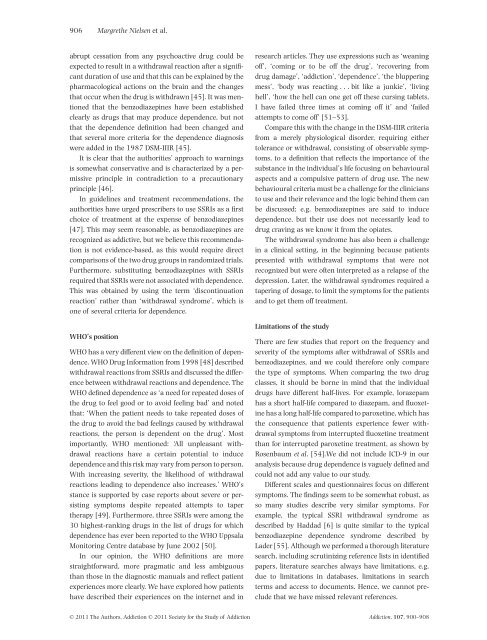1 Selective serotonin reuptake inhibitors (SSRI) â sales, withdrawal ...
1 Selective serotonin reuptake inhibitors (SSRI) â sales, withdrawal ...
1 Selective serotonin reuptake inhibitors (SSRI) â sales, withdrawal ...
You also want an ePaper? Increase the reach of your titles
YUMPU automatically turns print PDFs into web optimized ePapers that Google loves.
906 Margrethe Nielsen et al.<br />
abrupt cessation from any psychoactive drug could be<br />
expected to result in a <strong>withdrawal</strong> reaction after a significant<br />
duration of use and that this can be explained by the<br />
pharmacological actions on the brain and the changes<br />
that occur when the drug is withdrawn [45]. It was mentioned<br />
that the benzodiazepines have been established<br />
clearly as drugs that may produce dependence, but not<br />
that the dependence definition had been changed and<br />
that several more criteria for the dependence diagnosis<br />
were added in the 1987 DSM-IIIR [45].<br />
It is clear that the authorities’ approach to warnings<br />
is somewhat conservative and is characterized by a permissive<br />
principle in contradiction to a precautionary<br />
principle [46].<br />
In guidelines and treatment recommendations, the<br />
authorities have urged prescribers to use <strong>SSRI</strong>s as a first<br />
choice of treatment at the expense of benzodiazepines<br />
[47]. This may seem reasonable, as benzodiazepines are<br />
recognized as addictive, but we believe this recommendation<br />
is not evidence-based, as this would require direct<br />
comparisons of the two drug groups in randomized trials.<br />
Furthermore, substituting benzodiazepines with <strong>SSRI</strong>s<br />
required that <strong>SSRI</strong>s were not associated with dependence.<br />
This was obtained by using the term ‘discontinuation<br />
reaction’ rather than ‘<strong>withdrawal</strong> syndrome’, which is<br />
one of several criteria for dependence.<br />
WHO’s position<br />
WHO has a very different view on the definition of dependence.<br />
WHO Drug Information from 1998 [48] described<br />
<strong>withdrawal</strong> reactions from <strong>SSRI</strong>s and discussed the difference<br />
between <strong>withdrawal</strong> reactions and dependence. The<br />
WHO defined dependence as ‘a need for repeated doses of<br />
the drug to feel good or to avoid feeling bad’ and noted<br />
that: ‘When the patient needs to take repeated doses of<br />
the drug to avoid the bad feelings caused by <strong>withdrawal</strong><br />
reactions, the person is dependent on the drug’. Most<br />
importantly, WHO mentioned: ‘All unpleasant <strong>withdrawal</strong><br />
reactions have a certain potential to induce<br />
dependence and this risk may vary from person to person.<br />
With increasing severity, the likelihood of <strong>withdrawal</strong><br />
reactions leading to dependence also increases.’ WHO’s<br />
stance is supported by case reports about severe or persisting<br />
symptoms despite repeated attempts to taper<br />
therapy [49]. Furthermore, three <strong>SSRI</strong>s were among the<br />
30 highest-ranking drugs in the list of drugs for which<br />
dependence has ever been reported to the WHO Uppsala<br />
Monitoring Centre database by June 2002 [50].<br />
In our opinion, the WHO definitions are more<br />
straightforward, more pragmatic and less ambiguous<br />
than those in the diagnostic manuals and reflect patient<br />
experiences more clearly. We have explored how patients<br />
have described their experiences on the internet and in<br />
research articles. They use expressions such as ‘weaning<br />
off’, ‘coming or to be off the drug’, ‘recovering from<br />
drug damage’, ‘addiction’, ‘dependence’, ‘the bluppering<br />
mess’, ‘body was reacting ...bit like a junkie’, ‘living<br />
hell’, ‘how the hell can one get off these cursing tablets,<br />
I have failed three times at coming off it’ and ‘failed<br />
attempts to come off’ [51–53].<br />
Compare this with the change in the DSM-IIIR criteria<br />
from a merely physiological disorder, requiring either<br />
tolerance or <strong>withdrawal</strong>, consisting of observable symptoms,<br />
to a definition that reflects the importance of the<br />
substance in the individual’s life focusing on behavioural<br />
aspects and a compulsive pattern of drug use. The new<br />
behavioural criteria must be a challenge for the clinicians<br />
to use and their relevance and the logic behind them can<br />
be discussed; e.g. benzodiazepines are said to induce<br />
dependence, but their use does not necessarily lead to<br />
drug craving as we know it from the opiates.<br />
The <strong>withdrawal</strong> syndrome has also been a challenge<br />
in a clinical setting, in the beginning because patients<br />
presented with <strong>withdrawal</strong> symptoms that were not<br />
recognized but were often interpreted as a relapse of the<br />
depression. Later, the <strong>withdrawal</strong> syndromes required a<br />
tapering of dosage, to limit the symptoms for the patients<br />
and to get them off treatment.<br />
Limitations of the study<br />
There are few studies that report on the frequency and<br />
severity of the symptoms after <strong>withdrawal</strong> of <strong>SSRI</strong>s and<br />
benzodiazepines, and we could therefore only compare<br />
the type of symptoms. When comparing the two drug<br />
classes, it should be borne in mind that the individual<br />
drugs have different half-lives. For example, lorazepam<br />
has a short half-life compared to diazepam, and fluoxetine<br />
has a long half-life compared to paroxetine, which has<br />
the consequence that patients experience fewer <strong>withdrawal</strong><br />
symptoms from interrupted fluoxetine treatment<br />
than for interrupted paroxetine treatment, as shown by<br />
Rosenbaum et al. [54].We did not include ICD-9 in our<br />
analysis because drug dependence is vaguely defined and<br />
could not add any value to our study.<br />
Different scales and questionnaires focus on different<br />
symptoms. The findings seem to be somewhat robust, as<br />
so many studies describe very similar symptoms. For<br />
example, the typical <strong>SSRI</strong> <strong>withdrawal</strong> syndrome as<br />
described by Haddad [6] is quite similar to the typical<br />
benzodiazepine dependence syndrome described by<br />
Lader [55]. Although we performed a thorough literature<br />
search, including scrutinizing reference lists in identified<br />
papers, literature searches always have limitations, e.g.<br />
due to limitations in databases, limitations in search<br />
terms and access to documents. Hence, we cannot preclude<br />
that we have missed relevant references.<br />
© 2011 The Authors, Addiction © 2011 Society for the Study of Addiction Addiction, 107, 900–908





